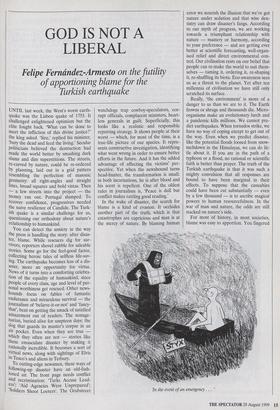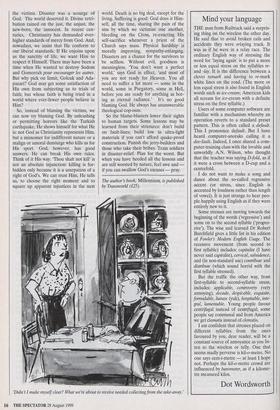GOD IS NOT A LIBERAL
Felipe Fernandez-Armesto on the futility
of apportioning blame for the Turkish earthquake
UNTIL last week, the West's worst earth- quake was the Lisbon quake of 1755. It challenged enlightened optimism but the elite fought back. 'What can be done to meet the infliction of this divine justice?' the king asked. 'Sire,' replied his minister, `bury the dead and feed the living.' Secular politicians believed the destruction had made the world better by smashing dark slums and dim superstitions. The streets, re-carved by nature, could be re-ordered by planning, laid out in a grid pattern resembling the perfection of masonic geometry: all right-angles and straight lines, broad squares and bold vistas. Then — a few streets into the project — the money ran out. Portugal slumped. To recover confidence, progressives needed the naive resilience of Candide. The Turk- ish quake is a similar challenge for us, questioning our orthodoxy about nature's relationship to humankind.
You can detect the anxiety in the way the press is handling the story: after disas- ter, blame. While rescuers dig for sur- vivors, reporters shovel rubble for saleable stories. Some go for the feel-good factor, collecting heroic tales of selfless life-sav- ing. The earthquake becomes less of a dis- aster, more an opportunity for virtue. News of it turns into a comforting celebra- tion of the equality of humankind, since people of every class, age and level of per- sonal worthiness get rescued. Other news- hounds focus on fables of fantastic endurance and miraculous survival — the journalism of 'believe-it-or-not' and 'fancy- that', bent on getting the smack of satisfied amazement out of readers. The nonage- narian, buried alive for umpteen days; the dog that guards its master's corpse in an air pocket. Even when they are true — which they often are not — stories like these emasculate disaster by making it rationally incredible. It becomes a sort of virtual news, along with sightings of Elvis in Tesco's and aliens in Tetbury. To cutting-edge newsmen, these ways of following-up disaster have an old-fash- ioned air. The front page needs conflict and recrimination: 'Turks Accuse Lead- ers';'Aid Agencies Were Unprepared'; Soldiers Shoot Looters'. The Grubstreet watchdogs trap cowboy-speculators, cor- rupt officials, complacent ministers, heart- less generals in guilt. Superficially, this looks like a realistic and responsible reporting strategy. It shows people at their worst — which, for most of the time, is a true-life picture of our species. It repre- sents constructive investigation, identifying what went wrong in order to ensure better efforts in the future. And it has the added advantage of affecting the victims' per- spective. Yet when the newshound turns head-hunter, the transformation is small: in both incarnations, he is after blood and his scent is repellent. One of the oldest rules in journalism is, 'Peace is dull but conflict makes rattling good reading.' In the wake of disaster, the search for blame is a kind of evasion. It occludes another part of the truth, which is that catastrophes are capricious and man is at the mercy of nature. By blaming human error we nourish the illusion that we've got nature under sedation and that wise den- tistry can draw disaster's fangs. According to our myth of progress, we are working towards a triumphant relationship with nature — mastery or harmony, according to your preference — and are getting ever better at scientific forecasting, well-organ- ised relief and direct environmental con- trol. Our civilisation rests on our belief that people can re-make the world to suit them- selves — taming it, ordering it, re-shaping it, re-shuffling its biota. Eco-awareness sees us as a threat to the planet. Yet after ten millennia of civilisation we have still only scratched its surface.
Really, 'the environment' is more of a danger to us than we are to it. The Earth frowns or shrugs and thousands die. Micro- organisms make an evolutionary lurch and a pandemic kills millions. We cannot pre- dict earthquakes. When tornados strike, we have no way of coping except to get out of the way. Even when we predict disaster, like the potential floods loosed from snow- meltdown in the Himalayas, we can do lit- tle about it. If you are in the path of a typhoon or a flood, no rational or scientific faith is better than prayer. The truth of the Turkish earthquake is that it was such a mighty convulsion that all responses are bound to have been marginal in their effects. To suppose that the casualties could have been cut substantially — even by a few thousand — is to ascribe magical powers to human resourcefulness. In the war of man and nature, the odds are still stacked on nature's side.
For most of history, in most societies, blame was easy to apportion. You fingered In the event of an emergency . . ' the victims. Disaster was a scourge of God. The world deserved it. Divine retri- bution rained on the just, the unjust, the new-born, the innocent. In recent cen- turies, Christianity has demanded ever- higher standards of mercy from God. And, nowadays, we insist that He conform to our liberal standards. If He enjoins upon us the sanctity of life, we want Him to respect it Himself. There may have been a time when He wanted to destroy Sodom and Gomorrah pour encourager les autres. But why pick on Izmit, Golcuk and Ada- pazari? God may get some satisfaction of His own from subjecting us to trials of faith; but whose faith is being tried in a world where ever-fewer people believe in Him?
So, instead of blaming the victims, we can now try blaming God. By unleashing or permitting horrors like the Turkish earthquake, He shows himself for what He is: not God as Christianity represents Him, but a misnomer for indifferent nature or a malign or amoral demiurge who kills us for His sport. God, however, has good answers. He can break His own rules. Think of it His way. 'Thou shalt not kill' is not an absolute injunction: killing is for- bidden only because it is a usurpation of a right of God's. We can trust Him, He tells us, to choose the right moment and to square up apparent injustices in the next world. Death is no big deal, except for the living. Suffering is good: God does it Him- self, all the time, sharing the pain of the sins by which we victimise one another, bleeding on the Cross, re-enacting His self-sacrifice whenever a priest of the Church says mass. Physical hardship is morally improving, sympathy-enlarging. Disasters are a chance for the survivors to be selfless. Without evil, goodness is meaningless. 'You don't want a perfect world,' says God in effect, 'and most of you are not ready for Heaven. You all need to suffer a lot more — some in the world, some in Purgatory, some in Hell, before you are ready for anything as bor- ing as eternal radiance.' It's no good blaming God. He always has unanswerable theological cop-outs.
So the blame-blasters lower their sights to human targets. Some lessons may be learned from their strictures: don't build on fault-lines; build low in ultra-light materials if you can't afford quake-proof construction. Punish the jerry-builders and those who take their bribes. Train soldiers in disaster-relief. Plan for the worst. But when you have heeded all the lessons and are still worsted by nature, feel awe and if you can swallow God's excuses — pray.
The author's book, Millennium, is published by Transworld (£25).



























































 Previous page
Previous page